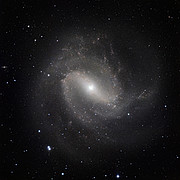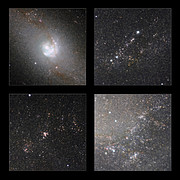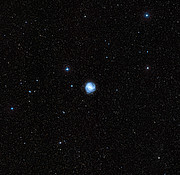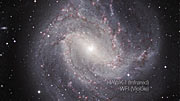Persbericht
Nieuwe, heldere blik op een klassiek spiraalstelsel
19 mei 2010

Acknowledgement: Mischa Schirmer)
ESO heeft een prachtige foto vrijgegeven van het nabije sterrenstelsel Messier 83. De opname is gemaakt met het HAWK-I instrument op ESO’s Very Large Telescope (VLT) op de Paranal-sterrenwacht in Chili. De infraroodopname met de krachtige camera is een van de scherpste en meest gedetailleerde van Messier 83 ooit gemaakt.
Het sterrenstelsel Messier 83 (eso0825) bevindt zich op een afstand van 15 miljoen lichtjaar in het sterrenbeeld Waterslang. Het strekt zich uit over 40.000 lichtjaar. Het heeft de omvang van 40 procent van de Melkweg, waar het veel op lijkt. Net als ons sterrenstelsel heeft Messier 83 een spiraalvorm en een balk met sterren in het midden. Messier 83 staat bekend om zijn vele supernovae, sterren die aan het eind van hun leven ontploffen. De laatste 100 jaar is er een recordaantal van zes supernovae waargenomen. Messier 83 is een van de helderste nabije sterrenstelsels, dat met een verrekijker is te zien.
Messier 83 is geobserveerd in infrarood licht met de krachtige HAWK-I camera [1] op de VLT. In de infraroodopname wordt het verduisterende stof waarin Messier 83 is gehuld, transparant. Het helder verlichte gas rond de jonge sterren in de spiraalarmen wordt minder dicht in het infrarood, waardoor veel meer van de structuur en de sterren in het stelsel te zien is. Astronomen die clusters van jonge sterren bestuderen, hebben veel aan zo’n opname. Onderzoek aan dergelijke clusters was dan ook een van de wetenschappelijke doelen van de observaties [2]. Vergeleken met eerdere opnamen, laat HAWK-I beduidend meer sterren in het melkwegstelsel zien.
De combinatie van de grote spiegel van de VLT, het grote blikveld en de gevoeligheid van de camera en de uitstekende waarneemcondities op ESO’s Paranal-sterrenwacht, maken HAWK-I een van de beste infraroodinstrumenten ter wereld. Astronomen staan in de rij om de camera, die sinds 2007 operationeel is, te gebruiken voor infraroodbeelden van de sterrenhemel.
Noten
[1] HAWK-I staat voor High-Acuity Wide-field K-band Imager. Informatie over technische details van de camera staat in een eerder persbericht (eso0736).
[2] De data die zijn gebruikt voor deze afbeelding zijn verzameld door een team onder leiding van Mark Gieles (University of Cambridge) en Yuri Beletsky (ESO). Mischa Schirmer (University of Bonn) heeft de data verwerkt.
Meer informatie
ESO, de Europese Zuidelijke Sterrenwacht, is de belangrijkste intergouvernementele sterrenkundeorganisatie in Europa en wereldwijd het meest productieve astronomische observatorium. ESO wordt ondersteund door 14 landen: België, Denemarken, Duitsland, Finland, Frankrijk, Italië, Nederland, Oostenrijk, Portugal, Spanje, Tsjechië, het Verenigd Koninkrijk, Zweden en Zwitserland. ESO voert een ambitieus programma uit gericht op het ontwerp, de bouw en de exploitatie van krachtige grondobservatoria die astronomen in staat stellen om belangrijke wetenschappelijke ontdekkingen te doen. ESO speelt ook een leidende rol in het bevorderen en organiseren van samenwerking in het sterrenkundig onderzoek. ESO exploiteert drie observatielocaties van wereldklasse in Chili: La Silla, Paranal en Chajnantor. Op Paranal exploiteert ESO de Very Large Telescope (VLT), 's werelds meest geavanceerde optische observatorium en ESO is de Europese partner van de revolutionaire telescoop ALMA. ESO is momenteel bezig met ontwerpstudies voor de 42-meter Europese Extremely Large optische/nabij-infrarood Telescoop ( E-ELT), die ‘het grootste oog op de hemel’ ter wereld zal worden.
Contact
Richard Hook
ESO
Garching, Germany
Tel: +49 89 3200 6655
E-mail: rhook@eso.org
Marieke Baan (Perscontact Nederland)
ESO Science Outreach Network
en NOVA Informatie Centrum
Tel: +31(0)20-5257480
E-mail: eson-netherlands@eso.org
Over dit bericht
| Persberichten nr.: | eso1020nl |
| Naam: | M 83 |
| Type: | Local Universe : Galaxy : Type : Spiral |
| Facility: | Very Large Telescope |
| Instruments: | HAWK-I |
Our use of Cookies
We use cookies that are essential for accessing our websites and using our services. We also use cookies to analyse, measure and improve our websites’ performance, to enable content sharing via social media and to display media content hosted on third-party platforms.
ESO Cookies Policy
The European Organisation for Astronomical Research in the Southern Hemisphere (ESO) is the pre-eminent intergovernmental science and technology organisation in astronomy. It carries out an ambitious programme focused on the design, construction and operation of powerful ground-based observing facilities for astronomy.
This Cookies Policy is intended to provide clarity by outlining the cookies used on the ESO public websites, their functions, the options you have for controlling them, and the ways you can contact us for additional details.
What are cookies?
Cookies are small pieces of data stored on your device by websites you visit. They serve various purposes, such as remembering login credentials and preferences and enhance your browsing experience.
Categories of cookies we use
Essential cookies (always active): These cookies are strictly necessary for the proper functioning of our website. Without these cookies, the website cannot operate correctly, and certain services, such as logging in or accessing secure areas, may not be available; because they are essential for the website’s operation, they cannot be disabled.
Functional Cookies: These cookies enhance your browsing experience by enabling additional features and personalization, such as remembering your preferences and settings. While not strictly necessary for the website to function, they improve usability and convenience; these cookies are only placed if you provide your consent.
Analytics cookies: These cookies collect information about how visitors interact with our website, such as which pages are visited most often and how users navigate the site. This data helps us improve website performance, optimize content, and enhance the user experience; these cookies are only placed if you provide your consent. We use the following analytics cookies.
Matomo Cookies:
This website uses Matomo (formerly Piwik), an open source software which enables the statistical analysis of website visits. Matomo uses cookies (text files) which are saved on your computer and which allow us to analyze how you use our website. The website user information generated by the cookies will only be saved on the servers of our IT Department. We use this information to analyze www.eso.org visits and to prepare reports on website activities. These data will not be disclosed to third parties.
On behalf of ESO, Matomo will use this information for the purpose of evaluating your use of the website, compiling reports on website activity and providing other services relating to website activity and internet usage.
Matomo cookies settings:
Additional Third-party cookies on ESO websites: some of our pages display content from external providers, e.g. YouTube.
Such third-party services are outside of ESO control and may, at any time, change their terms of service, use of cookies, etc.
YouTube: Some videos on the ESO website are embedded from ESO’s official YouTube channel. We have enabled YouTube’s privacy-enhanced mode, meaning that no cookies are set unless the user actively clicks on the video to play it. Additionally, in this mode, YouTube does not store any personally identifiable cookie data for embedded video playbacks. For more details, please refer to YouTube’s embedding videos information page.
Cookies can also be classified based on the following elements.
Regarding the domain, there are:
- First-party cookies, set by the website you are currently visiting. They are stored by the same domain that you are browsing and are used to enhance your experience on that site;
- Third-party cookies, set by a domain other than the one you are currently visiting.
As for their duration, cookies can be:
- Browser-session cookies, which are deleted when the user closes the browser;
- Stored cookies, which stay on the user's device for a predetermined period of time.
How to manage cookies
Cookie settings: You can modify your cookie choices for the ESO webpages at any time by clicking on the link Cookie settings at the bottom of any page.
In your browser: If you wish to delete cookies or instruct your browser to delete or block cookies by default, please visit the help pages of your browser:
Please be aware that if you delete or decline cookies, certain functionalities of our website may be not be available and your browsing experience may be affected.
You can set most browsers to prevent any cookies being placed on your device, but you may then have to manually adjust some preferences every time you visit a site/page. And some services and functionalities may not work properly at all (e.g. profile logging-in, shop check out).
Updates to the ESO Cookies Policy
The ESO Cookies Policy may be subject to future updates, which will be made available on this page.
Additional information
For any queries related to cookies, please contact: pdprATesoDOTorg.
As ESO public webpages are managed by our Department of Communication, your questions will be dealt with the support of the said Department.






